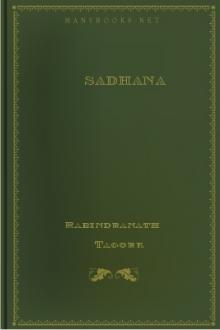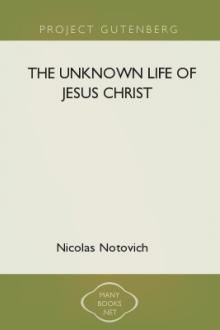Sadhana - Rabindranath Tagore (book club suggestions txt) 📗

- Author: Rabindranath Tagore
- Performer: -
Book online «Sadhana - Rabindranath Tagore (book club suggestions txt) 📗». Author Rabindranath Tagore
In some stage of our growth, in some period of our history, we try to set up a special cult of beauty, and pare it down to a narrow circuit, so as to make it a matter of pride for a chosen few. Then it breeds in its votaries affections and exaggerations, as it did with the Brahmins in the time of the decadence of Indian civilisation, when the perception of the higher truth fell away and superstitions grew up unchecked.
In the history of aesthetics there also comes an age of emancipation when the recognition of beauty in things great and small become easy, and when we see it more in the unassuming harmony of common objects than in things startling in their singularity. So much so, that we have to go through the stages of reaction when in the representation of beauty we try to avoid everything that is obviously pleasing and that has been crowned by the sanction of convention. We are then tempted in defiance to exaggerate the commonness of commonplace things, thereby making them aggressively uncommon. To restore harmony we create the discords which are a feature of all reactions. We already see in the present age the sign of this aesthetic reaction, which proves that man has at last come to know that it is only the narrowness of perception which sharply divides the field of his aesthetic consciousness into ugliness and beauty. When he has the power to see things detached from self-interest and from the insistent claims of the lust of the senses, then alone can he have the true vision of the beauty that is everywhere. Then only can he see that what is unpleasant to us is not necessarily unbeautiful, but has its beauty in truth.
When we say that beauty is everywhere we do not mean that the word ugliness should be abolished from our language, just as it would be absurd to say that there is no such thing as untruth.
Untruth there certainly is, not in the system of the universe, but in our power of comprehension, as its negative element. In the same manner there is ugliness in the distorted expression of beauty in our life and in our art which comes from our imperfect realisation of Truth. To a certain extent we can set our life against the law of truth which is in us and which is in all, and likewise we can give rise to ugliness by going counter to the eternal law of harmony which is everywhere.
Through our sense of truth we realise law in creation, and through our sense of beauty we realise harmony in the universe.
When we recognise the law in nature we extend our mastery over physical forces and become powerful; when we recognise the law in our moral nature we attain mastery over self and become free. In like manner the more we comprehend the harmony in the physical world the more our life shares the gladness of creation, and our expression of beauty in art becomes more truly catholic. As we become conscious of the harmony in our soul, our apprehension of the blissfulness of the spirit of the world becomes universal, and the expression of beauty in our life moves in goodness and love towards the infinite. This is the ultimate object of our existence, that we must ever know that “beauty is truth, truth beauty”; we must realise the whole world in love, for love gives it birth, sustains it, and takes it back to its bosom. We must have that perfect emancipation of heart which gives us the power to stand at the innermost centre of things and have the taste of that fullness of disinterested joy which belongs to Brahma.
Music is the purest form of art, and therefore the most direct expression of beauty, with a form and spirit which is one and simple, and least encumbered with anything extraneous. We seem to feel that the manifestation of the infinite in the finite forms of creation is music itself, silent and visible. The evening sky, tirelessly repeating the starry constellations, seems like a child struck with wonder at the mystery of its own first utterance, lisping the same word over and over again, and listening to it in unceasing joy. When in the rainy night of July the darkness is thick upon the meadows and the pattering rain draws veil upon veil over the stillness of the slumbering earth, this monotony of the rain patter seems to be the darkness of sound itself. The gloom of the dim and dense line of trees, the thorny bushes scattered in the bare heath like floating heads of swimmers with bedraggled hair, the smell of the damp grass and the wet earth, the spire of the temple rising above the undefined mass of blackness grouped around the village huts—everything seems like notes rising from the heart of the night, mingling and losing themselves in the one sound of ceaseless rain filling the sky.
Therefore the true poets, they who are seers, seek to express the universe in terms of music.
They rarely use symbols of painting to express the unfolding of forms, the mingling of endless lines and colours that goes on every moment on the canvas of the blue sky.
They have their reason. For the man who paints must have canvas, brush and colour-box. The first touch of his brush is very far from the complete idea. And then when the work is finished the artist is gone, the windowed picture stands alone, the incessant touches of love of the creative hand are withdrawn.
But the singer has everything within him. The notes come out from his very life. They are not materials gathered from outside. His idea and his expression are brother and sister; very often they are born as twins. In music the heart reveals itself immediately; it suffers not from any barrier of alien material.
Therefore though music has to wait for its completeness like any other art, yet at every step it gives out the beauty of the whole. As the material of expression even words are barriers, for their meaning has to be constructed by thought. But music never has to depend upon any obvious meaning; it expresses what no words can ever express.
What is more, music and the musician are inseparable. When the singer departs, his singing dies with him; it is in eternal union with the life and joy of the master.
This world-song is never for a moment separated from its singer.
It is not fashioned from any outward material. It is his joy itself taking never-ending form. It is the great heart sending the tremor of its thrill over the sky.
There is a perfection in each individual strain of this music, which is the revelation of completion in the incomplete. No one of its notes is final, yet each reflects the infinite.
What does it matter if we fail to derive the exact meaning of this great harmony? Is it not like the hand meeting the string and drawing out at once all its tones at the touch? It is the language of beauty, the caress, that comes from the heart of the world straightway reaches our heart.
Last night, in the silence which pervaded the darkness, I stood alone and heard the voice of the singer of eternal melodies.
When I went to sleep I closed my eyes with this last thought in my mind, that even when I remain unconscious in slumber the dance of life will still go on in the hushed arena of my sleeping body, keeping step with the stars. The heart will throb, the blood will leap in the veins, and the millions of living atoms of my body will vibrate in tune with the note of the harp-string that thrills at the touch of the master.
VIII THE REALISATION OF THE INFINITEThe Upanishads say: “Man becomes true if in this life he can apprehend God; if not, it is the greatest calamity for him.”
But what is the nature of this attainment of God? It is quite evident that the infinite is not like one object among many, to be definitely classified and kept among our possessions, to be used as an ally specially favouring us in our politics, warfare, money-making, or in social competitions. We cannot put our God in the same list with our summer-houses, motor-cars, or our credit at the bank, as so many people seem to want to do.
We must try to understand the true character of the desire that a man has when his soul longs for his God. Does it consist of his wish to make an addition, however valuable, to his belongings?
Emphatically no! It is an endlessly wearisome task, this continual adding to our stores. In fact, when the soul seeks God she seeks her final escape from this incessant gathering and heaping and never coming to an end. It is not an additional object the she seeks, but it is the nityo ‘nityanam, the permanent in all that is impermanent, the rasanam rasatamah, the highest abiding joy unifying all enjoyments. Therefore when the Upanishads teach us to realise everything in Brahma, it is not to seek something extra, not to manufacture something new.
Know everything that there is in the universe as enveloped by God. [Footnote: Ichavasyamdiam sarvam yat kincha jagatyanjagat.] Enjoy whatever is given by him and harbour not in your mind the greed for wealth which is not your own.
[Footnoe: Tena tyaktena bhunjitha ma gridhah kasyasviddhanam.]
When you know that whatever there is is filled by him and whatever you have is his gift, then you realise the infinite in the finite, and the giver in the gifts. Then you know that all the facts of the reality have their only meaning in the manifestation of the one truth, and all your possessions have their only significance for you, not in themselves but in the relation they establish with the infinite.
So it cannot be said that we can find Brahma as we find other objects; there is no question of searching from him in one thing in preference to another, in one place instead of somewhere else.
We do not have to run to the grocer’s shop for our morning light; we open our eyes and there it is; so we need only give ourselves up to find that Brahma is everywhere.
This is the reason why Buddha admonished us to free ourselves from the confinement of the life of the self. If there were nothing else to take its place more positively perfect and satisfying, then such admonition would be absolutely unmeaning.
No man can seriously consider the advice, much less have any enthusiasm for it, of surrendering everything one has for gaining nothing whatever.
So our daily worship of God is not really the process of gradual acquisition of him, but the daily process of surrendering ourselves, removing all obstacles to union and extending our consciousness of him in devotion and service, in goodness and in love.
The Upanishads say: Be lost altogether in Brahma like an arrow that has completely penetrated its target. Thus to be conscious of being absolutely enveloped by Brahma is not an act of mere concentration of mind. It must be the aim of the whole of our life. In all our thoughts and deeds we must be conscious of the infinite. Let the realisation of this truth become easier every day of our life, that





Comments (0)